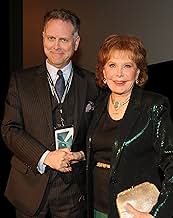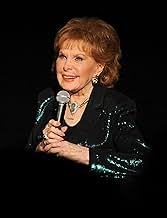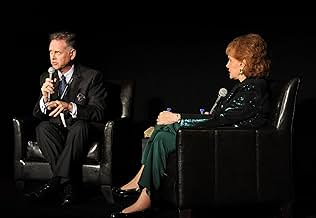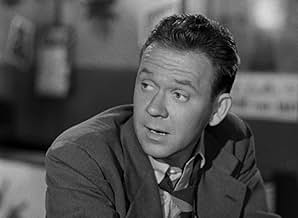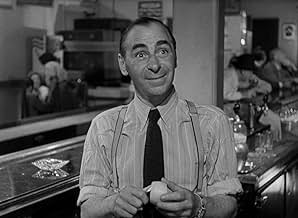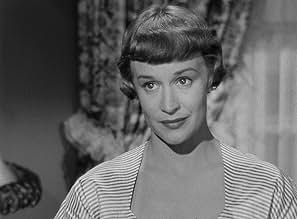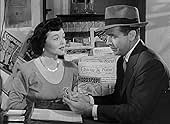CALIFICACIÓN DE IMDb
7.3/10
2.9 k
TU CALIFICACIÓN
El ex convicto Rocky Mulloy busca al verdadero culpable del crimen por el que fue inculpado en un mundo nocturno de damas engañosas y dobles intenciones.El ex convicto Rocky Mulloy busca al verdadero culpable del crimen por el que fue inculpado en un mundo nocturno de damas engañosas y dobles intenciones.El ex convicto Rocky Mulloy busca al verdadero culpable del crimen por el que fue inculpado en un mundo nocturno de damas engañosas y dobles intenciones.
- Dirección
- Guionistas
- Elenco
Hy Averback
- Bookie
- (as Hy Averbach)
Leon Alton
- Bartender
- (sin créditos)
Robert Bice
- Castro's Gunman
- (sin créditos)
Ralph Brooks
- Nightclub Patron
- (sin créditos)
Paul Cristo
- Waiter
- (sin créditos)
Sayre Dearing
- Cop
- (sin créditos)
- Dirección
- Guionistas
- Todo el elenco y el equipo
- Producción, taquilla y más en IMDbPro
Opiniones destacadas
Somehow, I missed this little gem over the years.
Excellent location filming, combined with a compelling script and great acting - a definite must-see for "film noir" fans. My only complaint is the somewhat stale performance by Rhonda Fleming - I think they needed somebody a bit more "earthy" for the part. Richard Erdman and Jean Porter are excellent in their supporting roles.
It was rare in 1951, to see so many actual locations in a film, but this is obviously a low-budget enterprise. Plus, the nature of "noir" is almost always to utilize reality, as opposed to artifice. I did notice some sloppiness with the usage of studio sets; the interiors of the trailers were, of course, sets, and many times when characters exit, the blank studio wall is clearly visible.
One goof occurs when Powell's character drops off Fleming at her office. As the car drives away, the cameraman is clearly visible in the window's reflection. Of course, who knew then that a viewer would eventually be able to freeze-frame a shot?
Great film.....highly recommended.
Excellent location filming, combined with a compelling script and great acting - a definite must-see for "film noir" fans. My only complaint is the somewhat stale performance by Rhonda Fleming - I think they needed somebody a bit more "earthy" for the part. Richard Erdman and Jean Porter are excellent in their supporting roles.
It was rare in 1951, to see so many actual locations in a film, but this is obviously a low-budget enterprise. Plus, the nature of "noir" is almost always to utilize reality, as opposed to artifice. I did notice some sloppiness with the usage of studio sets; the interiors of the trailers were, of course, sets, and many times when characters exit, the blank studio wall is clearly visible.
One goof occurs when Powell's character drops off Fleming at her office. As the car drives away, the cameraman is clearly visible in the window's reflection. Of course, who knew then that a viewer would eventually be able to freeze-frame a shot?
Great film.....highly recommended.
Like the old Sinatra song, things can be far better the second time around. The first time I saw "Cry Danger" it was shortly after a viewing of "Murder, My Sweet" and it just couldn't compare to that classic. I recently viewed the movie again and I must say that "Cry Danger" was a lot of fun.
The real stars of the movie are 1) the dialogue, and 2) Dick Powell's delivery of that dialogue. Bogart and Mitchum are blue collar guys who deliver these kinds of one-liners beautifully...and it stings...but Powell has an air of elegance and intelligence wrapped in a white collar, so when he gets caustic, condescending, sarcastic, and nasty, it seems to hurt even more. And it hurts so good. There is nothing more delicious to Noir fans than Powell letting rip with a great one-liner. And the more casual he is, the more "tossed away" the line is delivered, the more we grin with satisfaction. It's just a thing of beauty.
The supporting cast is good, with just about everyone pulling their weight admirably. William Conrad, Regis Toomey, and Rhonda Fleming are in fine form. I was expecting twists, turns, and deceit from Erdman's character, but after an interesting reveal in the beginning of the film, his character seems to be abandoned and left only to provide some comic relief. That missed opportunity aside, though, the script is fun and moves along briskly.
The direction is just fine, though not as dark as I would have liked it...but that is a minor complaint. There is a rawness and realism to these B films that I find much more rewarding than a lot of the glossy A films produced.
8 out of 10 for a thoroughly enjoyable hour and a half crawl through the seedy underbelly of Tinsel Town.
The real stars of the movie are 1) the dialogue, and 2) Dick Powell's delivery of that dialogue. Bogart and Mitchum are blue collar guys who deliver these kinds of one-liners beautifully...and it stings...but Powell has an air of elegance and intelligence wrapped in a white collar, so when he gets caustic, condescending, sarcastic, and nasty, it seems to hurt even more. And it hurts so good. There is nothing more delicious to Noir fans than Powell letting rip with a great one-liner. And the more casual he is, the more "tossed away" the line is delivered, the more we grin with satisfaction. It's just a thing of beauty.
The supporting cast is good, with just about everyone pulling their weight admirably. William Conrad, Regis Toomey, and Rhonda Fleming are in fine form. I was expecting twists, turns, and deceit from Erdman's character, but after an interesting reveal in the beginning of the film, his character seems to be abandoned and left only to provide some comic relief. That missed opportunity aside, though, the script is fun and moves along briskly.
The direction is just fine, though not as dark as I would have liked it...but that is a minor complaint. There is a rawness and realism to these B films that I find much more rewarding than a lot of the glossy A films produced.
8 out of 10 for a thoroughly enjoyable hour and a half crawl through the seedy underbelly of Tinsel Town.
Dick Powell is pardoned for a crime and searches for justice in post-war Los Angeles. Powell moves into a seamy trailer park on a hill overlooking the downtown (there is a great film shot of this) and teams with a disabled ex-marine. Powell confronts a gangster named Castro, played by William Conrad. Castro is definitely bad news for everyone around him.
The plot is not exceptional and certainly does not transcend B-movie standards, but the film is visually good and somehow the characters and the setting create a milieu which draws in the viewer. Definitely worth watching.
The plot is not exceptional and certainly does not transcend B-movie standards, but the film is visually good and somehow the characters and the setting create a milieu which draws in the viewer. Definitely worth watching.
Among the male stars of the noir cycle, Dick Powell was the most peevish. When Humphrey Bogart smart-talked, it was with a wry bonhomie; when Robert Mitchum did it, it was with mumbled nonchalance. But when Powell snaps back a retort, you know he's got his dander up. This drastic change from his earlier days as happy-go-lucky hoofer began with his assumption (the first) of Philip Marlowe in Murder, My Sweet and continued in Cornered, Johnny O'Clock, To the Ends of the Earth, and The Pitfall. His prickly temper informs Robert Parrish's Cry Danger, the last true noir he would appear in before affecting a pipe and cardigans in The Bad and the Beautiful.
Carrying a grip with the weight of the world in it, Powell steps off a train in Los Angeles; he's just spent five years in prison for a robbery and murder for which he took the rap. Luckily, a war-wounded and hard-drinking Marine (Richard Erdman), with whom he was supposedly drinking when the job was pulled, surfaced to give him an alibi. But Powell has never met this old buddy before.
Nonetheless, they throw their lot together and rent an armadillo-like trailer in a run-down park, where the wife of his old partner (Rhonda Fleming) lives, too. Powell has scores to settle, beginning with big-time bookie William Conrad who, he reckons, owes him $50-grand. Conrad pays off in classic mob fashion, by giving him a tip on a fixed race. The payoff money puts the police on his tail, as its marked bills are part of the take from the old robbery. But all traces of the illegal book have vanished, so Powell can't prove his innocence. He starts stalking Conrad for revenge, even though he's dodging pot-shots in the trailer park, while the duplicity that ensnared him lies much closer to home....
Cry Danger has a number of points in its favor, chief among them the pitiless photography of Joseph Biroc (it's decidedly the low-rent side of the City of Angels). Parrish keeps hustling the story along, nonetheless slowing down enough to allow Erdman a craftily underplayed, memorable performance (the same can't be said of Fleming, who simply lacks the wherewithal to function convincingly as femme fatale). There's a high quotient of violence, too particularly when Powell extracts a confession from Conrad through a one-sided game of Russian Roulette. Somehow, though, the ingenuity of the earlier part of the picture starts to peter out near the end, turning its oddly low-key ending into something of an afterthought.
Carrying a grip with the weight of the world in it, Powell steps off a train in Los Angeles; he's just spent five years in prison for a robbery and murder for which he took the rap. Luckily, a war-wounded and hard-drinking Marine (Richard Erdman), with whom he was supposedly drinking when the job was pulled, surfaced to give him an alibi. But Powell has never met this old buddy before.
Nonetheless, they throw their lot together and rent an armadillo-like trailer in a run-down park, where the wife of his old partner (Rhonda Fleming) lives, too. Powell has scores to settle, beginning with big-time bookie William Conrad who, he reckons, owes him $50-grand. Conrad pays off in classic mob fashion, by giving him a tip on a fixed race. The payoff money puts the police on his tail, as its marked bills are part of the take from the old robbery. But all traces of the illegal book have vanished, so Powell can't prove his innocence. He starts stalking Conrad for revenge, even though he's dodging pot-shots in the trailer park, while the duplicity that ensnared him lies much closer to home....
Cry Danger has a number of points in its favor, chief among them the pitiless photography of Joseph Biroc (it's decidedly the low-rent side of the City of Angels). Parrish keeps hustling the story along, nonetheless slowing down enough to allow Erdman a craftily underplayed, memorable performance (the same can't be said of Fleming, who simply lacks the wherewithal to function convincingly as femme fatale). There's a high quotient of violence, too particularly when Powell extracts a confession from Conrad through a one-sided game of Russian Roulette. Somehow, though, the ingenuity of the earlier part of the picture starts to peter out near the end, turning its oddly low-key ending into something of an afterthought.
Cry Danger (1951)
Humphrey Bogart smiles. Robert Mitchum smiles. Lots of tough film noir types also show a grin or manage a laugh. But not Dick Powell. Forever grim and determined, he is a the archetype of an unhappy man, and usually, as in "Cry Danger," he's out to fix some problem.
This is a Dick Powell movie all the way, and a really good one. There are some great secondary characters, especially the mob leader William Conrad and a suspicious and wise-cracking Marine sidekick played by Richard Erdman. And the plot is good, if twisting slightly and improbable at times. It's also a somewhat cheaply made affair, with a car crash that won't convince a child, and some sets that show their seams. But hey, who cares? It barrels along and stern stiff unflappable Powell (his name is Rocky Mulloy in the movie) won't be stopped, even by love, even by duplicity. And certainly not by cops who should have arrested him several times for his liberties while on parole.
This is director Robert Parrish's first film, and he didn't really direct much later of note except, in 1966, a couple scenes in "Casino Royale." Between the two he did a bunch of so-so westerns. William Conrad, who is thirty at the time of filming here, went on to be television's "Cannon" and "Jake and the Fat Man," but he appeared in a bunch of these B-list noirs and is good every time. The leading woman is a simple type, and good enough at it, but her most memorable role is in "Spiral Staircase," a couple years earlier (definitely see that one). She, too, like half of Hollywood, drifted to t.v. by 1960.
Powell's career is interesting, and his last big role before moving to television himself was in "The Bad and the Beautiful," just a year later. He is never quite a distinctive leading man, and I'm guessing he thought of this as just bread and butter work, but he gives it his usual steely best, and holds the movie together. The other leading character has to be 1950 L.A., without the glamour. Every scene is gritty and real, night and day, and it's yet another sign of end of the studio system and the rise of t.v., with all the location shooting.
A fast, fun one, well filmed.
Humphrey Bogart smiles. Robert Mitchum smiles. Lots of tough film noir types also show a grin or manage a laugh. But not Dick Powell. Forever grim and determined, he is a the archetype of an unhappy man, and usually, as in "Cry Danger," he's out to fix some problem.
This is a Dick Powell movie all the way, and a really good one. There are some great secondary characters, especially the mob leader William Conrad and a suspicious and wise-cracking Marine sidekick played by Richard Erdman. And the plot is good, if twisting slightly and improbable at times. It's also a somewhat cheaply made affair, with a car crash that won't convince a child, and some sets that show their seams. But hey, who cares? It barrels along and stern stiff unflappable Powell (his name is Rocky Mulloy in the movie) won't be stopped, even by love, even by duplicity. And certainly not by cops who should have arrested him several times for his liberties while on parole.
This is director Robert Parrish's first film, and he didn't really direct much later of note except, in 1966, a couple scenes in "Casino Royale." Between the two he did a bunch of so-so westerns. William Conrad, who is thirty at the time of filming here, went on to be television's "Cannon" and "Jake and the Fat Man," but he appeared in a bunch of these B-list noirs and is good every time. The leading woman is a simple type, and good enough at it, but her most memorable role is in "Spiral Staircase," a couple years earlier (definitely see that one). She, too, like half of Hollywood, drifted to t.v. by 1960.
Powell's career is interesting, and his last big role before moving to television himself was in "The Bad and the Beautiful," just a year later. He is never quite a distinctive leading man, and I'm guessing he thought of this as just bread and butter work, but he gives it his usual steely best, and holds the movie together. The other leading character has to be 1950 L.A., without the glamour. Every scene is gritty and real, night and day, and it's yet another sign of end of the studio system and the rise of t.v., with all the location shooting.
A fast, fun one, well filmed.
¿Sabías que…?
- TriviaIn an interview with Tom Weaver, Jean Porter said the film was "directed by Dick Powell, and he wasn't given director credit. Dick gave Robert Parrish the director's credit, but Dick did all the directing."
- ErroresAs Rocky drives away after dropping Nancy off at work, the cameraman and camera are reflected in the car's rear window glass.
- Citas
Darlene LaVonne: You drinkin' that stuff so early?
Delong: Listen, doll girl, when you drink as much as I do, you gotta start early.
- ConexionesEdited from El crimén del museo (1946)
Selecciones populares
Inicia sesión para calificar y agrega a la lista de videos para obtener recomendaciones personalizadas
- How long is Cry Danger?Con tecnología de Alexa
Detalles
- Fecha de lanzamiento
- País de origen
- Sitios oficiales
- Idioma
- También se conoce como
- Cry Danger
- Locaciones de filmación
- New Grand Hotel - 257 Grand Avenue, Bunker Hill, Downtown, Los Ángeles, California, Estados Unidos(Crosley Hotel - exteriors and interors)
- Productoras
- Ver más créditos de la compañía en IMDbPro
- Tiempo de ejecución1 hora 19 minutos
- Color
- Relación de aspecto
- 1.33 : 1
Contribuir a esta página
Sugiere una edición o agrega el contenido que falta

Principales brechas de datos
By what name was Peligro (1951) officially released in India in English?
Responda

